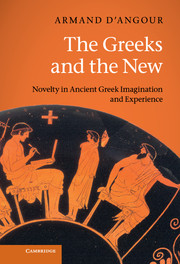Book contents
- Frontmatter
- Contents
- Acknowledgements
- Introduction
- Chapter 1 New, new, new
- Chapter 2 Loosening the grip of the past
- Chapter 3 The transformations of Kaineus
- Chapter 4 Old and new
- Chapter 5 Nothing new under the sun
- Chapter 6 The birth of Athena
- Chapter 7 Inventions of Eris
- Chapter 8 The newest song
- Chapter 9 Constructions of novelty
- Chapter 10 So what's new?
- References
- General index
- Index of Greek terms
- Index locorum
Chapter 1 - New, new, new
Published online by Cambridge University Press: 07 September 2011
- Frontmatter
- Contents
- Acknowledgements
- Introduction
- Chapter 1 New, new, new
- Chapter 2 Loosening the grip of the past
- Chapter 3 The transformations of Kaineus
- Chapter 4 Old and new
- Chapter 5 Nothing new under the sun
- Chapter 6 The birth of Athena
- Chapter 7 Inventions of Eris
- Chapter 8 The newest song
- Chapter 9 Constructions of novelty
- Chapter 10 So what's new?
- References
- General index
- Index of Greek terms
- Index locorum
Summary
Au fond de l'inconnu pour trouver du nouveau…
BaudelaireIn today's world, with its unprecedented technological capabilities and global interconnections, novelty is a constant and inescapable feature of everyday life. The pursuit of the new drives commerce, science, education and the arts. Creativity is commodified, originality is considered the key to success. Novelty is sought out by inventors, extolled by advertisers, devoured by consumers. ‘Innovation’ is the buzzword of modernity. ‘News’ is a term so implicated with rapid and sophisticated communications media that its semantic connection to ‘new’ is often all but forgotten. Words such as newness, news, novelty and innovation, despite their very different connotations, exhibit a family resemblance in that they all in some way converge upon the everyday, if deceptively simple-seeming, notion of ‘the new’. This notion retains the power to arouse a range of responses, negative as well as positive. It evokes pleasure and excitement, anxiety and resignation. Newness entails change, an inescapable aspect of the world and of the human condition. But to experience the new is to register a change that is in some way heightened, striking, or salient.
- Type
- Chapter
- Information
- The Greeks and the NewNovelty in Ancient Greek Imagination and Experience, pp. 11 - 35Publisher: Cambridge University PressPrint publication year: 2011

